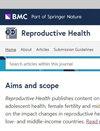Exploring women’s knowledge of abortion legality and association with source of abortion care using population-based survey data in Côte d’Ivoire and Ghana
IF 3.6
2区 医学
Q1 PUBLIC, ENVIRONMENTAL & OCCUPATIONAL HEALTH
引用次数: 0
Abstract
Knowledge of the conditions under which abortion is legal is important so that people can advocate for their right to abortion care. Yet minimal research has explored the association between women’s knowledge of abortion legality and the induced abortion care they receive, particularly using population-based survey data. Using national survey data collected by Performance Monitoring for Action (PMA) in Côte d’Ivoire and Ghana, we aimed to compare the prevalence of accurate knowledge of abortion legality, factors associated with knowledge of the law, and the association between knowledge of abortion legality and the source of women’s induced abortion care in these two settings. We ran bivariate and multivariable logistic regressions to assess the relationships of interest. We found that awareness and knowledge of the abortion law were low in both Côte d’Ivoire and Ghana. In Cote d’Ivoire, women who were older, more educated, and with past abortion experience were more likely to be aware of the law. In Ghana, knowledge of the law did not vary significantly by demographic characteristics. However, in Ghana, knowledge of the law was correlated with women’s use of the formal healthcare system for abortion care, with greater use of clinical sources in rural areas. It is possible that for populations with reduced access to abortion services, such as those in rural areas, knowledge of the law is advantageous for those seeking facility-based abortion care, particularly in settings where abortion is legal for a range of indications. Interventions seeking to improve access to facility-based abortion care in settings where abortion is legal on various grounds should incorporate education on the legal grounds for abortion. Knowledge of the conditions under which abortion is legal is important for people to advocate for their right to abortion care, yet minimal research has explored the association between women’s knowledge of abortion legality and the abortion care they receive, particularly using population-based survey data. Using national survey data collected by Performance Monitoring for Action (PMA) in Côte d’Ivoire and Ghana, we aimed to compare the prevalence of accurate knowledge of abortion legality, factors associated with knowledge of the law, and the association between knowledge of abortion legality and the source of women’s abortion care in these two settings. We ran bivariate and multivariable logistic regressions to assess the relationships of interest. We found that awareness and knowledge of the abortion law were low in both Côte d’Ivoire and Ghana. In Côte d’Ivoire, knowledge was unequally distributed according to sociodemographic factors, while such inequities did not exist in Ghana. However, in Ghana, knowledge of the law was correlated with women’s use of the formal healthcare system for abortion care, with greater use of clinical sources in rural areas. It is possible that for populations with reduced access to abortion services, such as those in rural areas, knowledge of the law is advantageous for those seeking facility-based abortion care, particularly in settings where abortion is legal for a range of indications. Interventions seeking to improve access to facility-based abortion care in settings where abortion is legal on various grounds should incorporate education on the legal grounds for abortion.利用科特迪瓦和加纳的人口调查数据,探讨妇女对堕胎合法性的认识及其与堕胎护理来源的关系
了解人工流产合法的条件非常重要,这样人们才能主张自己获得人工流产护理的权利。然而,有关妇女对人工流产合法性的了解与她们所接受的人工流产护理之间关系的研究却少之又少,尤其是使用基于人口的调查数据。我们利用 "行动绩效监测"(PMA)在科特迪瓦和加纳收集的全国调查数据,旨在比较这两个国家的妇女对人工流产合法性的准确了解程度、与法律知识相关的因素,以及人工流产合法性知识与人工流产护理来源之间的关联。我们通过双变量和多变量逻辑回归来评估相关关系。我们发现,科特迪瓦和加纳对人工流产法的认识和了解程度都很低。在科特迪瓦,年龄较大、受教育程度较高且有过堕胎经历的妇女更有可能了解堕胎法。在加纳,不同人口特征的妇女对法律的了解程度差异不大。然而,在加纳,法律知识与妇女使用正规医疗系统进行人工流产护理的情况相关,在农村地区,妇女更多地使用临床来源。对于获得堕胎服务机会较少的人群(如农村地区)来说,了解法律知识可能对那些寻求设施内堕胎护理的人有利,尤其是在对各种适应症的堕胎合法的情况下。在堕胎因各种原因合法的环境中,为改善获得基于设施的堕胎护理的机会而采取的干预措施应包括关于堕胎的法律依据的教育。了解堕胎合法的条件对于人们主张其获得堕胎护理的权利非常重要,但很少有研究探讨妇女对堕胎合法性的了解与她们所接受的堕胎护理之间的关联,尤其是使用基于人口的调查数据。我们利用 "行动绩效监测"(PMA)在科特迪瓦和加纳收集的全国调查数据,旨在比较这两个国家的妇女对堕胎合法性的准确了解程度、与法律知识相关的因素以及堕胎合法性知识与堕胎护理来源之间的关联。我们进行了二元和多元逻辑回归来评估相关关系。我们发现,科特迪瓦和加纳对堕胎法的认识和了解程度都很低。在科特迪瓦,知识根据社会人口因素的不同而分布不均,而在加纳则不存在这种不平等现象。然而,在加纳,法律知识与妇女使用正规医疗系统进行人工流产护理相关,农村地区的妇女更多地使用临床来源。对于获得堕胎服务机会较少的人群(如农村地区)来说,了解法律知识可能对那些寻求基于设施的堕胎护理的人有利,尤其是在针对各种适应症的堕胎合法的情况下。在堕胎因各种原因合法的情况下,寻求改善获得基于设施的堕胎护理的干预措施应纳入有关堕胎法律依据的教育。
本文章由计算机程序翻译,如有差异,请以英文原文为准。
求助全文
约1分钟内获得全文
求助全文
来源期刊

Reproductive Health
PUBLIC, ENVIRONMENTAL & OCCUPATIONAL HEALTH-
CiteScore
6.00
自引率
5.90%
发文量
220
审稿时长
>12 weeks
期刊介绍:
Reproductive Health focuses on all aspects of human reproduction. The journal includes sections dedicated to adolescent health, female fertility and midwifery and all content is open access.
Reproductive health is defined as a state of physical, mental, and social well-being in all matters relating to the reproductive system, at all stages of life. Good reproductive health implies that people are able to have a satisfying and safe sex life, the capability to reproduce and the freedom to decide if, when, and how often to do so. Men and women should be informed about and have access to safe, effective, affordable, and acceptable methods of family planning of their choice, and the right to appropriate health-care services that enable women to safely go through pregnancy and childbirth.
 求助内容:
求助内容: 应助结果提醒方式:
应助结果提醒方式:


